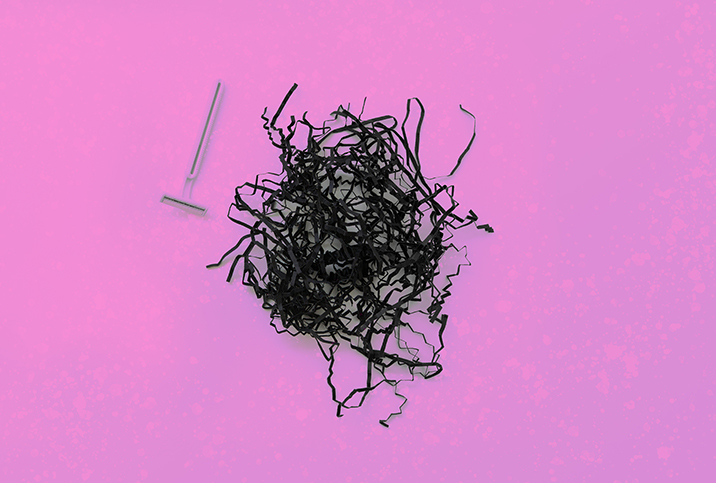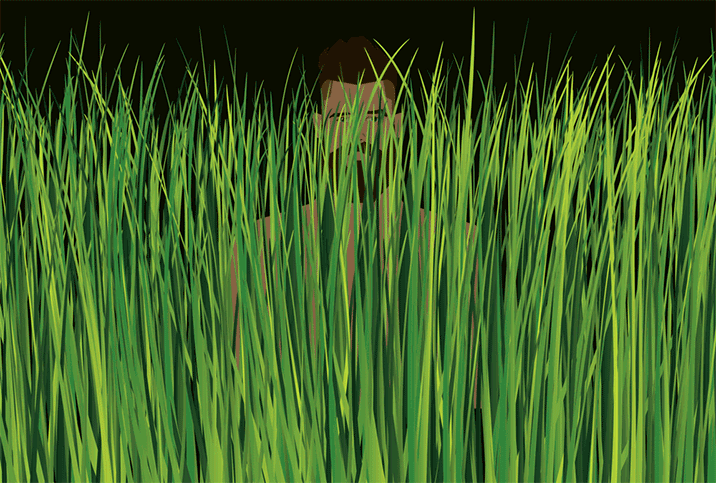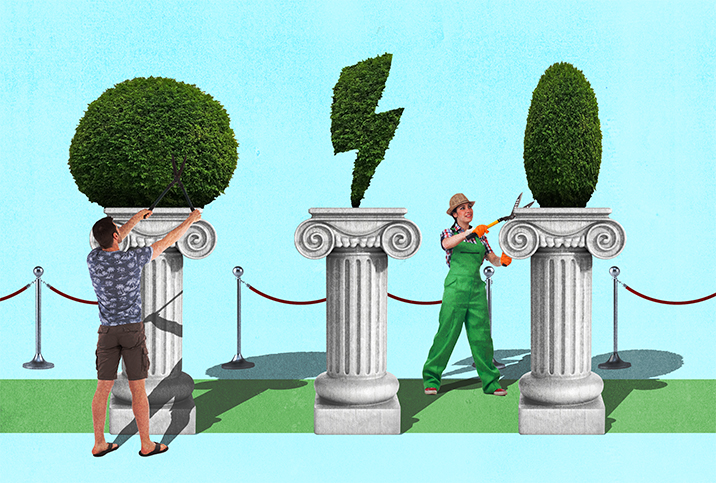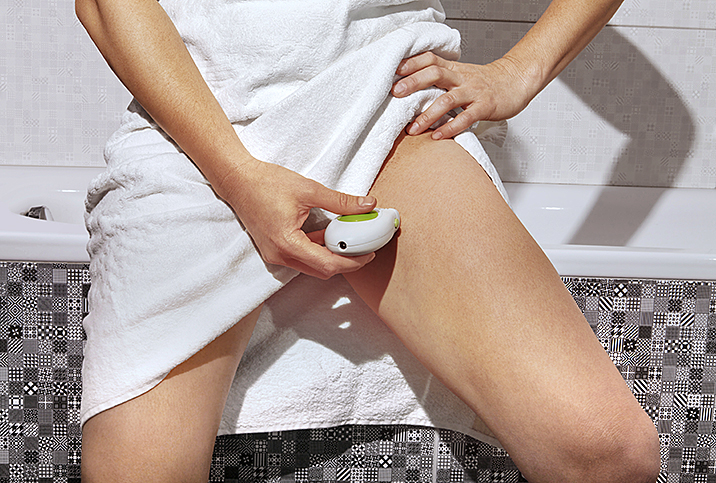Investigating the Who and Why of Body Hair

Some cultural norms are so deeply rooted that it feels like they've always been the law of the land. However, America's obsession with body hair—or the lack thereof for women—didn't begin until the 1920s. During this time, sleeveless dresses became popular and magazine ads began targeting women, selling them the importance of getting rid of unsightly underarm and leg hair.
A few years later, a booming industry took root. Fast forward to today, and the global hair removal products market size is projected to be worth about $5 billion by 2027.
Our obsession with body hair removal has really picked up during the past century. We happily fell in love with women with body hair for a couple hundred thousand years—what changed?
Body hair and sexual attraction
Adult film actress Hazel Grace, company owner at InMelanin Productions in Oceanside, California, said shaved bodies are the most popular look in the porn industry, though she specified that "trimmed" hair around genitalia is preferred at the moment.
On Instagram, Grace is proud to show off her armpit hair. She tries not to shave body hair frequently when not actively shooting.
"I feel [pubic hair] is more natural and keeps my privates safe," she explained. "That's the natural purpose of it anyway, to protect you. It's mature. And sometimes I don't want to shave every week. It's better for my skin as shaving regularly can cause issues."
The list of grievances against shaving includes itching, razor burn, ingrown hairs and bumps, cuts, folliculitis and the frequency, anywhere from weekly to daily.
Grace has witnessed male performers being chastised for not shaving. Smooth bodies tend to be celebrated and featured as aspirational across media, particularly in the fashion and beauty industry.
New York City-based fashion editor and stylist Kristopher Fraser said he's never seen a female model come to a photoshoot set with body hair during his eight-year career.
"We are selling a fantasy," Fraser said. "There have been male models, though, where I'm like, for the love of Balmain, please shave! I don't want to see you coming to set like you were left in the wilderness."
It's different for men
About 57 percent of American women and men said it's unattractive for women to have underarm hair, according to the YouGov Body Image Study 2021. But before you blame the male gaze, women (60 percent) were more likely than men (54 percent) to have that opinion. Of course, this may be an echo of the insecurities caused by anti-hair messages permeating the media.
For men, there appears to be more stigma when you pass through the rainbow.
John Hernandez, a gay writer in New York, said he shaved his body hair in his late teens and early 20s because he thought he needed to fit a gay ideal.
"Once I got involved with the bear community, they would scold me for shaving," he said. "They definitely helped me embrace my body hair, which is plentiful, and now I find it sexy, and so do they."
The bear community is a subculture among gay men based on their appearance. A bear is considered to be a larger, hairier man who portrays rugged masculinity. In the LGBTQIA+ community, body hair can inspire various reactions depending on whom you ask.
"I think that most kinks/fetishes are thought of as a taboo, something countercultural and against the norm," Hernandez explained. "Smooth bodies are the norm in our culture, not only for gay men but for women as well. So I think it becomes somewhat fetishized due to its controversial nature.
"However, for queer men, in particular, it goes beyond that and can tap into preconceived ideas of masculinity, or perhaps hypermasculinity, when it comes to body hair," he continued. "I'm thinking leather daddies of the '70s and those types of classically butch-looking men that represent that ideal for certain people."
However, hetero men don't live shame-free. A hairy back is a turnoff regardless of gender or sex: Two-thirds of Americans think it's unattractive for men to have hairy backs, according to the YouGov poll. Ironically, women are more likely than men to say this is the case, despite being more likely to accept their partner as is.
Pubic hair should be about attraction and fertility
Marika Tiggemann, Ph.D., a fellow of the Academy of Social Sciences in Australia and distinguished emeritus professor at Flinders University in Adelaide, said society's perspective on body hair has definitely been culturally determined.
"We can see this in the history of pubic hair removal," she added. "Until relatively recently, all grown women had pubic hair, often a source of attraction and celebrated, but not anymore. This is particularly societally determined, as pubic hair is a sign of sexual maturity and fertility, etcetera. Likewise, the idea of underarm hair being disgusting or unclean is purely social."
The beauty industry's war on body hair has only further established women's bodies as something to be improved. In 2004, Tiggemann and fellow researcher Christine Lewis investigated the hairlessness norm among women, surveying 198 undergraduate students (91 men, 107 women). The study concluded that body hair on women, but not on men, had become an elicitor of disgust and its removal, including pubic hair, was correspondingly normative. Tiggemann said the vehemence or strength of the rules for women surprised her the most.
This phenomenon is emphasized by how quickly unhealthy beauty ideals can go viral, which is a major contributor to the stigma against women's bodies, Tiggemann explained.
"Men can be clean-shaven or have a beard and it doesn't matter much," she said. "But the fact [is] that women have to shave legs, underarms and pubes, and if they don't, this is viewed as unkempt, unclean or disgusting. And they are subject to comments from partners, etcetera, which means that, yes, women's 'normal' bodies are unacceptable."
Regarding innate preferences, Tiggemann said it's possible men might prefer generally less hairy women, as hairiness is a distinguishing feature between males and females.
"However, underarm and pubic hair are definitionally features of mature women and should not be implicated here," she added. "Current humans are obsessed with attractiveness. Biologically, men should prefer women with wide hips, which is not the current ideal. So, again, where we are is largely socially determined."
Unlearning negative associations
Licensed psychologist and sex therapist Shannon Chavez, Psy.D., who practices in Beverly Hills, California, explained that tastes and interests are based on individual and cultural experiences, and learned and observed behavior. Therefore, the future of body hair doesn't have to be so grim.
"There are strong messages programmed in the subconscious mind in childhood that are strongly influenced by sociocultural factors and family dynamics," Chavez said. "Early messages or reactions from parents to questions about sexuality or hair may lead to shame or judgments towards others. Culture and religion play a big role with strong messages around acceptable standards for body hair, genital hygiene and body odor, with different standards for men and women."
Shame and stigma regarding body hair might have been birthed by the media, but your preferences for it may have been passed down from previous generations. Ultimately, Chavez said it's never appropriate to demand anything regarding physicality from your romantic partner.
"Feeling entitled to these expectations or that you are in control of a partner's behavior is a problematic behavior for couples," she explained. "In most cases, it involves much more than body hair and may require a deep dive into the couple's relationship dynamics and communication. Vanity may be a defense mechanism and have more to do with how one feels about self than the partner. It can also be communicated in a way where it expresses values and desires without being offensive or demanding towards a partner."
Perspective and preference begin within
Chavez advised touching your own body hair and normalizing that it has a biological function, which is not disgusting or embarrassing. You can have a more sensual experience with your body and hair by rewiring your internal messaging from "I have to shave" to "I enjoy the shave."
She recommended starting or stopping shaving to experience different stages of hair growth as you may find you like the way it looks and feels. She added that you should examine where the negative messages around body hair are coming from and perhaps take a break from these sources for a while.
In a related way, hairiness doesn't have to be celebrated only by the queer community. Chavez explained kinks can be healthy when practiced safely and with consent.
"Have a hair date with a partner where you celebrate each other's hair from head to feet and enjoy the touch and feel together as an intimate activity," she suggested. "Make body hair a part of your erotic template and change the messages from negative to positive and empowering. And then share these messages with others."
Most hair strands grow at an average rate of about 0.3 to 0.4 millimeters daily. Let's make sure society's self-esteem grows with it.




















